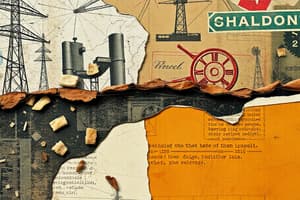Podcast
Questions and Answers
What does weathering refer to?
What does weathering refer to?
The disintegration and decomposition of rocks.
What is regolith?
What is regolith?
- The solid ground beneath the soil.
- A type of sedimentary rock.
- The uppermost layer of soil.
- A loose layer of fragments that covers much of Earth’s surface. (correct)
Mechanical weathering alters the chemical composition of rocks.
Mechanical weathering alters the chemical composition of rocks.
False (B)
Which of the following is a process of mechanical weathering?
Which of the following is a process of mechanical weathering?
What happens during thermal expansion and contraction?
What happens during thermal expansion and contraction?
Match the types of weathering with their definitions:
Match the types of weathering with their definitions:
What are some factors that can control weathering and mass movement?
What are some factors that can control weathering and mass movement?
Flashcards are hidden until you start studying
Study Notes
Weathering
- Weathering is the disintegration and decomposition of rocks, including physical and chemical breakdown.
- Regolith is a loose layer of fragments covering much of Earth's surface.
- Soil is the uppermost layer of regolith that supports rooted plants.
Types of Weathering
- Mechanical/Physical Weathering breaks rocks into smaller fragments, but doesn't change composition.
- Frost Wedging: expansion of freezing water in cracks causes rock to break.
- Thermal Expansion and Contraction: Repeated heating and cooling can crack and separate materials due to volume changes.
- Mechanical Exfoliation: Sheeting or peeling off layers of rock due to pressure release.
- Abrasion: Wearing down by friction from wind, water, or gravity.
- Plant Growth: Roots growing in cracks can exert pressure and break rocks.
- Chemical Weathering: Changes the chemical composition of rocks and minerals.
Studying That Suits You
Use AI to generate personalized quizzes and flashcards to suit your learning preferences.




